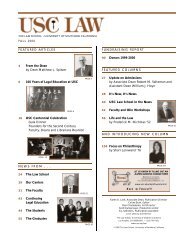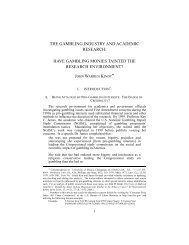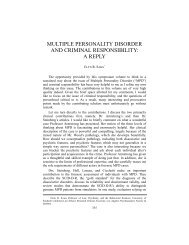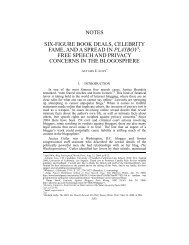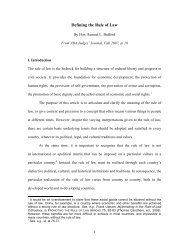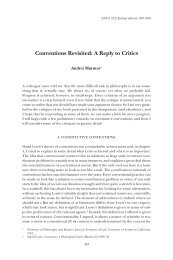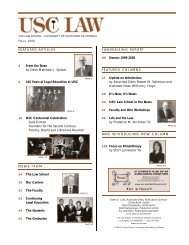1 Regulating Sex Work Adrienne D. Davis VERY ROUGH DRAFT ...
1 Regulating Sex Work Adrienne D. Davis VERY ROUGH DRAFT ...
1 Regulating Sex Work Adrienne D. Davis VERY ROUGH DRAFT ...
You also want an ePaper? Increase the reach of your titles
YUMPU automatically turns print PDFs into web optimized ePapers that Google loves.
Hence, privacy and sexual gratification are noteworthy as the only areas of Title VII<br />
where customer “tastes for discrimination” trump workers’ rights to equal treatment. 172<br />
Importantly, though, employers cannot defer to their own or their customers’<br />
racial preferences or biases. Unlike sex, neither race nor disability has a bfoq exemption.<br />
The standard for disability is that employers must make “reasonable accommodations”<br />
and not deny an opportunity to an otherwise qualified individual. 173 And race is<br />
straightforward: [add judicial quote re no bfoq for race]. Yet, when it comes to<br />
“authenticity,” there appear to be some implied bfoq’s for race in employment. For<br />
instance, commentators have speculated that law enforcement can fairly limit undercover<br />
agents by race, i.e., limit Klan infiltration to white officers. 174 There also seem to be<br />
implied exemptions in the appearance-industries. Most notably, Russell Robinson and<br />
Michael J. Franks have both observed that race seems to enjoy an implied bfoq for race in<br />
the highly influential and profitable filmmaking industry. 175 Writing in 2001 and 2007,<br />
neither author found any litigation regarding the very prevalent racial preferences in<br />
casting decisions. 176 As Robinson observes, “Indeed, when it comes to casting, an entire<br />
industry effectively disregards Title VII.” 177 Noting the prevalence of racial<br />
specifications in casting breakdowns, 178 he continues, “the EEOC carves out casting as an<br />
arbitrary exception to the normal requirement that an applicant be considered as an<br />
individual and not saddled with group-based stereotypes and the ban on catering to<br />
sexual gratification business. “Businesses explicitly selling sexual titillation may do so only by positioning<br />
themselves within the traditionally marginalized and stigmatized sex industry. Businesses that seek to bring<br />
sexual titillation into the mainstream by combining sexual titillation (and sex-based hiring) with the sale of<br />
other goods and services are not permitted to exist.” Id. at 196. Ann McGinley, on the other hand, is not as<br />
sanguine about the plus-sex/sexual gratification dichotomy. McGinley finds “[t]he lines between sex work,<br />
work in a highly sexualized environment, and other work requiring employees to ‘sell’ their sex or gender<br />
to give up control over their intimate emotions are hazy.” McGinley, supra note [x], at 95 (footnote<br />
omitted). Instead, “[o]ften, a woman’s job prospects and ability to advance within an enterprise are linked<br />
to her setting the proper gender tone on the scale of commodification.” Id. at 94 (footnote omitted).<br />
172<br />
Kimberly Yuracko, however, disputes this as the real reason for the distinction. Instead, she contends<br />
[add].<br />
173<br />
[add citation]<br />
174<br />
Some have also suggested that newspapers might send white reporters to interview Klan members. [add<br />
citations] Russell Robinson observes that “A few courts have suggested without holding that Title VII<br />
could permit a BFOQ for race in certain contexts, like police forces and prison security.” Russell K.<br />
Robinson, Casting and Caste-ing: Reconciling Artistic Freedom and Antidiscrimination Norms, 95 CALIF.<br />
L. REV. 1, 41 (2007).<br />
175<br />
Michael J. Franks, Justifiable Discrimination in the News and Entertainment Industries: Does Title VII<br />
Need a Race or Color BFOQ?, 35 U.S.F. L. REV. 473 (2001); Robinson, supra note [x].<br />
176<br />
Franks, supra note [x], (“There is not a single reported case in which an actor has sued a director for<br />
race-based casting decisions, even though it is common.”); Robinson, supra note [x] (noting his research<br />
“did not turn up a single published decision in which a court adjudicated an actor’s Title VII claim of race<br />
or sex discrimination.”). [fill in Hunter Tylo pregnancy discrimination suit; jury decision for $4.8 million,<br />
which many speculate was based on Spelling’s accommodation of previous pregnant actresses; (cite<br />
Russell’s UCLA brief)].<br />
177<br />
Robinson, supra note [x], at 5.<br />
178<br />
Robinson contrasts race and sex specifications in casting breakdowns. “This common sequencing<br />
suggests that sex forms the foundation of a character more than the traits that follow, such as race and<br />
age.”; 45.2% of breakdowns had racial code, versus 94% for gender and "”women over 40 [who] are as<br />
much a minority as any ethnic group.”” Robinson, supra note [x], at 19.<br />
31



